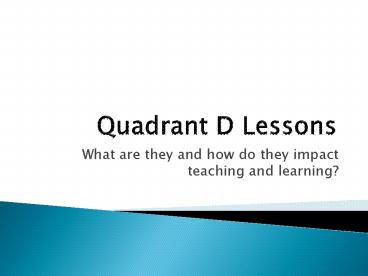Quadrant D Lessons - PowerPoint PPT Presentation
1 / 19
Title:
Quadrant D Lessons
Description:
List. Label. Locate. Calculate. Convert. Define. Explain. Infer. Propose. Interpret ... View movies that show human emotions and behaviors. ... – PowerPoint PPT presentation
Number of Views:86
Avg rating:3.0/5.0
Title: Quadrant D Lessons
1
Quadrant D Lessons
- What are they and how do they impact teaching and
learning?
2
What is a Quadrant D Lesson?
- The Rigor/Relevance Framework is a tool developed
by staff of the International Center for
Leadership in Education to examine what we teach
in schools, how we teach it, and how we decide if
students have learned the material. - A Quadrant D lesson is one that falls into the
D Quadrant of the Rigor/Relevance Framework
tool as shown below.
3
Example Verbs by Thinking Level
- Level 3 -Application
- Manipulate
- Use
- Solve
- Utilize
- Operate
- Maintain
- Relate
- Level 2 - Comprehension
- Calculate
- Convert
- Define
- Explain
- Infer
- Propose
- Interpret
- Level 1-Knowledge
- Arrange
- Check
- Choose
- Find
- List
- Label
- Locate
Quadrant A B
4
Example Verbs by Thinking Level
- Level 6 -
Evaluation
- Level 5 -
- Criticize
- Determine
- Judge
- Rate
- Assess
- Decide
- Rule On
Synthesis
- Level 4-
- Build
- Compile
- Compose
- Create
- Develop
- Produce
- Form
Analysis
- Audit
- Dissect
- Divide
- Examine
- Study
- Test
- Inspect
Quadrant C D
5
(No Transcript)
6
(No Transcript)
7
(No Transcript)
8
(No Transcript)
9
Three Most Important Qualities of a Quadrant D
Lesson
- Is the lesson I am teaching for application?
- Acquiring knowledge to complete work to apply to
something - Is the lesson real world?
- Application is the same as it would be for adults
in a job - Standards for performance are the same for adult
roles - Is there only one right way or can the end
product be unique or unpredictable? - Are there multiple variables that will affect the
product? - Is the outcome unpredictable or potentially
different every time? - Are there unknown factors such as (environment,
people, time)?
10
Rigor/Relevance Framework
D
C
Determine the height of the tallest structures in
Brownsburg using a protractor and write a
persuasive paper making recommendations for the
placement of tornado sirens to be sent to the
Town Council.
Measure the sides and angles of a right triangle
using the Pythagorean Theorem and trigonometric
ratios.
RIGOR
High
B
A
Go to the cafetorium, check to see that the
tables are square through the measurements.
Find and measure the sides of a right triangle
using Pythagorean Theorem.
Low
High
Low
RELEVANCE
11
Rigor/Relevance Framework
D
C
Analyze and debate the role of government in
population control such as China one child
policy.
Participate in a Socratic seminar on a issue,
such as urban sprawl.
RIGOR
High
B
A
Research the growth of another country and relate
to U.S. growth.
Make a map showing the growth of the U.S. from
1783 to 1914.
Low
High
Low
RELEVANCE
12
Rigor/Relevance Framework
D
C
Research and collect data and form
recommendations for a dietary plan for someone
with diabetes or heart disease.
Research and produce a news program on healthy
foods.
RIGOR
High
B
A
Construct models of molecules using toothpicks,
marsh-mallows, and gumdrops.
Conduct experiments to measure calories in foods.
Low
High
Low
RELEVANCE
13
Rigor/Relevance Framework
D
C
Research, write, and produce a persuasive
commercial with the purpose of convincing the
school administration to add new elective classes.
Analyze commercials for word choice that elicits
emotion.
RIGOR
High
B
A
View movies that show human emotions and
behaviors.
Write captions for cartoons depicting the
emotions pride and fear.
Low
High
Low
RELEVANCE
14
Rigor/Relevance Framework
C
D
RIGOR
Create a full web site for a local business.
High
Compare features of web development software.
B
A
Demonstrate web development software functions.
Low
Design web page.
High
Low
RELEVANCE
15
Rigor/Relevance Framework
Teacher/Student Roles
KNOWLEDGE
D
C
Student Thinks
Student Thinks Works
B
A
Teacher Works
Student Works
A P P L I C A T I O N
16
Rigor/Relevance Framework
Influence
KNOWLEDGE
D
C
Teacher Directed
Student Controlled
B
A
Externally Directed
Teacher Controlled
A P P L I C A T I O N
17
Rigor/Relevance Framework
Problems
KNOWLEDGE
C
D
Projects
A
B
Activities
A P P L I C A T I O N
18
Why should I care about Quadrant D lessons?
- Quadrant D lessons prepare students for life
beyond school. - They prepare students for the work force and to
be the leaders of tomorrow in the 21st Century.
19
21st Century Skills
www.21stcenturyskills.org
- Learning Innovation Skills
- Creativity Innovation
- Critical Thinking Problem-solving
- Communication Collaboration
- Information, Media Technology Skills
- Information Literacy
- Media Literacy
- ICT Literacy
- (Information Communication Technology)
- Life Career Skills
- Flexibility Adaptability
- Initiative Self-direction
- Social Cross-cultural Skills
- Productivity Accountability
- Leadership Responsibility
- BCSC 21 Century Skills Focus
- Global Awareness
- Civic Literacy
- Technology Literacy

